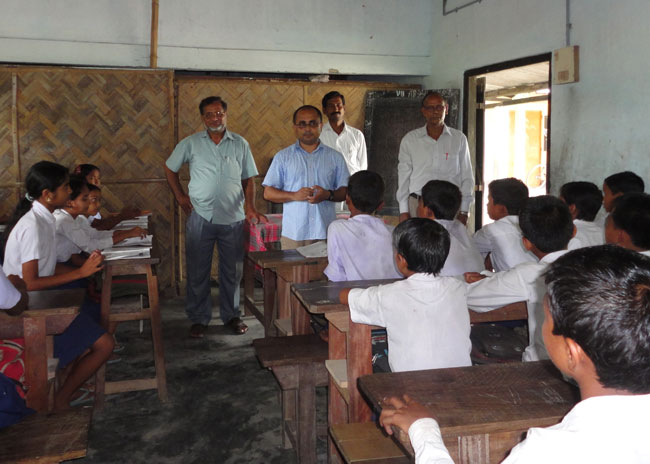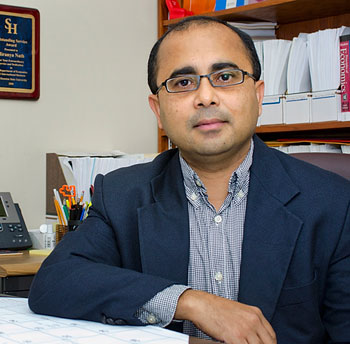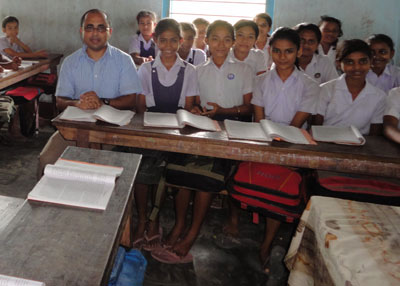Award-Winning Economics Researcher Finds Inspiration In Heritage
Nov. 17, 2011
SHSU Media Contact: Meredith Mohr
 |
| Economics professor Hiranya Nath's routine visits to his home country, India, not only provides him with a means for studying the economies of developing countries but allows him to share his knowledge with students there. —Submitted photos; —Home page photo (and photo directly below) by Brian Blalock |
 A world away from the small village in India where he grew up, Sam Houston State University economics professor Hiranya Nath has an office crammed with books and papers—the tangible evidence of his work at the university, studying macro and monetary economics, and development and information economics.
A world away from the small village in India where he grew up, Sam Houston State University economics professor Hiranya Nath has an office crammed with books and papers—the tangible evidence of his work at the university, studying macro and monetary economics, and development and information economics.
Somewhere in between the books and papers, according to Nath, is one of the most important tools he uses: his worldview.
“Going back to India to visit my family is a really conducive environment to my economic thinking,” Nath said. “The India of today, one of the fastest growing countries in the world, is not the same India I grew up in. It is constantly changing and growing, and I am amazed at the progressive economy there. Since I grew up there, it is easy to link my research on developing countries and understand it better using my worldview.”
He earned his bachelor’s and master’s degree from the University of Delhi, his Master of Philosophy degree in economics from Jawaharlal Nehru University and a Master of Arts in Economics and a Doctorate in Economics from Southern Methodist University.
He has taught at SHSU in the department of economics and international business since 2002.
For his doctoral research, Nath studied movements in prices of various commodities and services over time. Most macro/monetary economics research focuses on inflation, the increase in the general price level; however, changes in prices of commodities and services relative to each other (underlying changes in the general price level) have important consequences for decisions made by consumers and producers, according to Nath.
After he joined the economics faculty at SHSU, he extended this analysis to study consumer prices across U.S. cities, saying the differences in consumer prices and inflation across cities have important implications for people’s decisions about where to live and work and for businesses’ decisions about where to invest.
Nath said his interest and involvement in information economics research began “just by accident.”
“As a doctoral student, I worked for a professor at Cox School of Business at SMU one summer and ended up writing a few papers with him,” Nath said. “He needed an economic perspective and I needed a job. Eventually someone at UCLA noticed and published some of my work.”
One of his coauthored papers “Information Services in the U.S. Economy: Value, Jobs and Management Implications”, published in California Management Review has been a required reading for graduate-level courses in several universities including the University of California in Berkley.
Since he joined the SHSU faculty, Nath has published more than 30 peer-reviewed articles in various outlets including well-respected journals. For his work in monetary, developmental and information economics, Nath was awarded the SHSU Faculty Excellence in Research Award this year.
Nath has found a great deal of interest in information economics, his most recent project.
“I analyze structural shifts, not just in terms of income but also in terms of employment,” Nath said. “Roughly 50 percent of the total employment in the U.S. economy is information workers who are involved in creating, processing, and communicating information. That’s where the economy is headed. Fifty five cents out of every dollar spent is for information services, which include education, telecommunication, newspapers, Internet, financial services etc.. These shifts are going to have a huge impact on the U.S. economy in the next 10-20 years.”
Nath has also been working on research involving the economies of developing countries, an area that has a particularly personal meaning for him, he said.
 |
| Remembering the impact of his education in India, Nath visits schools when he goes home to stress the importance of innovation on their "bright young minds." |
“I was raised in a village in Assam, a state in northeast India,” Nath said. “My parents were low income and could not afford many things. My school was in very bad shape. There was no roof or electricity and there was a shortage of teachers. Somehow I made best use of the limited resources and tried hard. My teachers and my parents encouraged me a lot. That education has been such an important part of my life and it led me to where I am today. I believe education in developing countries is so important, especially in the context of how countries such as India are developing with the innovation of bright young minds.”
That innovation is exactly what he has observed over the past few years when he has traveled back to India to visit his family. As he says, “It is an environment I am inspired by.”
But Nath also noted that parallel to the creativity of young minds spurring India forward was a “generational disconnect.”
“As things in India are changing, both in terms of society and technology, I am beginning to notice a rift in the people of the older generation and the current generation,” Nath said. “Kids there now live in a virtual society. During my childhood, everyone used to go outside and play together but now they all have Facebook accounts and go to Internet cafes. Technology has arrived in a big way. The generation of their parents does not seem to understand these changes very well and are skeptical. This leads to an overall negativity.
“This presents a problem that is difficult to overcome—one generation has the money and the power over another, but they do not seem to be optimistic about their society changing, and their children are already in the process of change, some of them born into it. They are very bright, but that only goes so far; they need some sort of support from their parents. Someone needs to provide them the confidence that they can do it. I think about my academic training when I go back and know that is important for me to emphasize.”
According to Nath, 25 percent of the population still lives under the poverty line in India. Despite the unevenness stemming from growth and prosperity being in different pockets, he said there are examples of hope for continued economic growth in India. Even poor people have innovative ideas, only if they could overcome various constraints.
“My sister, who runs an embroidery school, sometimes orders tea from a roadside tea vendor for her employees and customers,” Nath said. “In the past, the man would send his young son around to take orders from all the nearby shops and then he would deliver the tea. But a few years back, he talked to all his customers and established a system using his prepaid mobile phone. Say if they give him one missed call, he understands they want five cups of tea. Two missed calls means a different amount of tea, and so forth. He knows that if he answers his phone, he will have to pay for the minutes, so he just works from the missed call system and has successfully established a more efficient and innovative way of running his business.”
Nath said these are the stories and examples that continue to inspire him in his economic research and in his teaching at SHSU. As he studies these areas of research, he also encourages his students to start thinking like economists and to be challenged by these issues, that they may someday find solutions in them.
- END -
This page maintained by SHSU's Communications Office
Assistant Director: Julia May
Writer: Jennifer Gauntt
Located in the 115 Administration Building
Telephone: 936.294.1836; Fax: 936.294.1834
Please send comments, corrections, news tips to Today@Sam.edu.

 SamWeb
SamWeb My Sam
My Sam E-mail
E-mail

